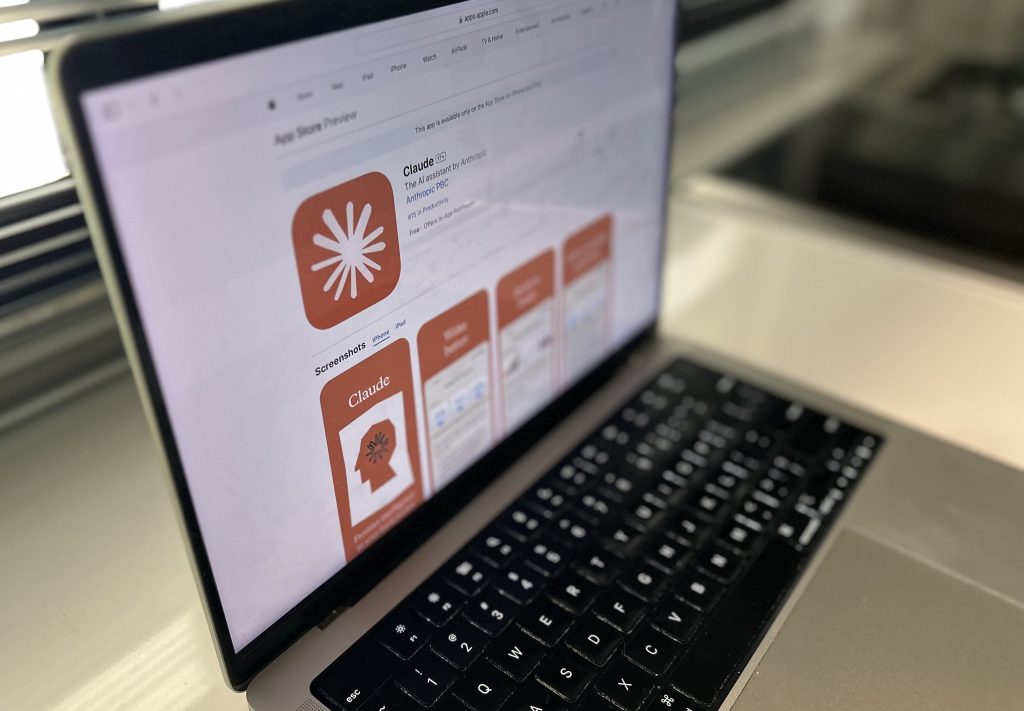Anthropic’s Claude is arguably the best consumer-facing large language model at the moment, with its top-tier version having bested OpenAI’s GPT-4 in at least one major benchmark test and on a popular LLM user evaluation site. So it’s only natural that Anthropic would take advantage of the halo effect by releasing a Claude iOS app.
After all, if Anthropic had kicked this can down the road a few months, it most likely would have been releasing an app to promote a language model that had just been beaten up and shoved in a locker by GPT-5.
The app, called Claude, was released on the App Store on Wednesday, May 1, and it works with both free and paid versions of Claude. The experience of using it is hampered a bit by the experience of trying to download it, which requires you to navigate through a swamp of spammy off-brand Claude apps. If you find the one from creator “Anthropic PBC,” you’ve found it.
After messing with it a bit, Mashable can officially report that the Claude app is pleasant to use, but, as with all AI apps, its limitations will become clear almost immediately. It’s also a little less feature-rich than OpenAI’s ChatGPT app, even if you’re giving Anthropic money for access to Claude Pro.
The overall app experience with Claude is nice
Credit: Mashable screengrab from Anthropic’s Claude
Just like the browser version of Claude, the mobile version clearly wants you to feel like you’re dealing with a concierge, not a word-barfing robot. I wouldn’t be the first person to point out that Claude is just a hair more personable than ChatGPT as an LLM, and thanks to the little time-based greeting it provides when you fire it up, the app has nice vibes, too. It also makes a difference that there’s a slightly lighter, earth-tone-tinted aesthetic that makes ChatGPT’s austere black-and-white seem antiseptic.
Still, to be clear, we are comparing two soulless machines and praising one for its superior paint job.
You’ll notice Claude’s rate limit more easily than on desktop
Credit: Mashable screengrab from Anthropic’s Claude
Claude seems to change its rate limits from time to time, but it’s never bothered me in the past. Even as a paying user, I had never found the current limit of 30 generations per day with Claude 3 Opus to be a particularly onerous restriction. I’m a big fan of toying around with AI, but before I had access to Claude on mobile, I never reached the limit. Testing the app out today, however, I crashed into the limit pretty quickly and had to switch from the elite Opus model to the slightly inferior Sonnet model.
Such are the hazards of testing an app for a hands-on article, but I’m positive I’ll bump up against this problem in the near future as well. Joking around with chatbot apps in social situations is a different experience from using one in a desktop browser, leading to profligate (and sometimes chemically enhanced) usage. A mobile app practically guarantees that people will take Claude to happy hours and birthday parties and go wild with it. This will lead to frustration as Pro users downgrade to the free-tier models, and free users find themselves locked out completely.
Prompting Claude with images is seamless and quick, but…
Unlike unpaid ChatGPT users, free-tier Claude users can prompt the model with images on the go. This is far and away the most fun you’ll have using the Claude app, and a good reason for everyone to give it a try.
Credit: Mashable screengrab from Anthropic’s Claude
Claude’s friendly writing voice aims to delight, and even I occasionally fell prey to its charms, like when I asked it do evaluate my dog for physical beauty. Yes Claude, my dog does indeed have a “sweet face and inquisitive gaze.” Thank you for noticing.
By prompting the chatbot with smartphone images, you can ask Claude to help you navigate the world, and it can occasionally be genuinely helpful, like when I asked it if I could throw a pair of AirPods into my garbage bin.
Credit: Mashable Screengrab from Anthropic’s Claude
You’re not supposed to do this because AirPods have batteries in them, and Claude got that right.
However, when you ask it to combine an image with its knowledge of the world and demand that it also throw in a bit of logic, it may fall on its face, as when I asked it if I could park in a spot that, according to this sign (which is cropped out by the app in this image) had become fair game a few minutes earlier.
Credit: Mashable screengrab from Anthropic’s Claude
Claude correctly ascertained that it was Wednesday, the day parking is partly forbidden on my street. Unfortunately, even though it was able to figure out that the sign said no parking was allowed from 8 a.m. until 10 a.m., it couldn’t seem to glean that it was 10:15 a.m. at that moment, and erroneously told me that “parking is prohibited on this street at the current time.” Bad Claude.
Other minor gripes about Claude
Much as the app could, if the developers chose to allow it, base its response on information pulled from my phone’s system clock, it could also, in theory, act like a wearable AI assistant and pull in my GPS location. It could then incorporate that into an answer, allowing users to prompt it with questions like, “What are some tourist attractions nearby?” or “Where is the nearest playground?” This isn’t really a complaint, but it’s a noticeable limitation.
After all, if we aren’t supposed to use these apps as competitors for more robust “AI assistants,” then what are they for? On the other hand, AI assistant devices like the Rabbit R1 and the Humane Ai Pin are generally regarded as junk, at least for the time being, so the big AI companies probably don’t feel an urgent need to incorporate their fancier features.
Another thing the Claude app doesn’t have — and probably doesn’t need: the option to have answers read out loud, like ChatGPT. It also doesn’t have anything like ChatGPT’s fun but odd “ChatGPT Voice” feature, which allows you to have a spoken conversation with the bot. Again, it’s just as well.
Claude is nice to use, and it puts Anthropic’s top-of-the-line multimodal language model on your smartphone. It doesn’t do anything else, and that’s fine.







